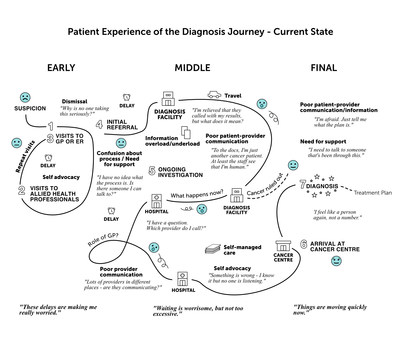NEW REPORT REVEALS OPPORTUNITIES TO IMPROVE CANCER DIAGNOSIS - THE MOST INEFFICIENT AREA OF CANCER CARE IN CANADA
New Canadian report includes findings & recommendations to improve cancer diagnosis amid
coming echo pandemic in cancer
TORONTO, Feb. 15, 2022 /CNW/ - All.Can Canada has just launched a new report to improve cancer diagnosis for people in Canada by focusing on what matters most to patients. The report, titled 'Optimizing Diagnosis in Canadian Cancer Care', reveals findings from a comprehensive research project and six actionable recommendations to improve cancer diagnosis.

The research included a literature review, interviews with patients and caregivers, and a survey of healthcare providers across Canada. The patients and caregivers interviewed represent an inclusive range of different types of cancer, gender, socioeconomic status, jurisdiction, and geography.
"If you don't get a swift diagnosis and enter into cancer care in a timely fashion, treatment can't start. We need to listen to what cancer patients say would improve their experience of diagnosis," says Kathy Barnard, who is a stage IV melanoma survivor, Founder of Save Your Skin Foundation, and a member of All.Can Canada's steering committee. "People are cycling around trying to get their symptoms investigated for months, sometimes years. This was already happening before COVID-19 and now things are worse. Ignoring the findings of this report would be a missed opportunity to do the right thing by people who desperately need cancer care and make changes that would make a real difference."
Cancer is the leading cause of death in Canada. Due to missed diagnoses during the pandemic, we are now facing an echo pandemic in cancer. Before the pandemic, it was already estimated that 2 in 5 Canadians (40%) would get cancer in their lifetime and 1 in 4 (25%) would die from their disease.1 With COVID-19, things have just become worse. Alberta, British Columbia, and Quebec reported a 20-23% drop in cancer diagnoses from June – September 2020. It is predicted that cancer care disruptions during the pandemic could lead to 21,247 more cancer deaths in Canada over the next decade. The represents 355,173 years of lost life expected due to pandemic-related diagnostic and treatment delays.2
All.Can Canada's report reveals the labyrinth most people experience when trying to diagnose a suspicion of cancer. From the moment a person tries to interact with a healthcare provider over a suspicion of cancer to the point they receive their diagnosis, seven outcomes were identified as critical to a quality diagnosis experience:
1) Swiftness of the diagnosis process;
2) Validation of concerns by primary care providers;
3) Excellent patient-provider communication;
4) Effective provider-provider communication;
5) Better information;
6) Integrated psychosocial support; and
7) Coordinated and managed care.
Achieving an improved future state of cancer diagnosis doesn't mean starting from scratch. Through the research, numerous opportunities and existing practices were discovered that, if adapted and scaled for jurisdictional and regional needs, are an excellent place to begin the realization of an optimized future state of cancer diagnosis in which the seven key outcomes are achieved for everyone in Canada.
| _____________________________________ |
| 1Cancer Statistics at a Glance," Canadian Cancer Society, 2021. https://cancer.ca/en/research/cancer-statistics/cancer-statistics-at-a-glance |
| 2Malagad, et al. "Predicted long-term impact of COVID-19 pandemic-related care delays on cancer incidence and mortality in Canada," McGill University, 2021. |
About All.Can Canada
All.Can Canada is a patient-led, multi-stakeholder, national initiative committed to ensuring swift, accurate, and appropriately delivered diagnosis of cancer in Canada. The report, 'Optimizing Diagnosis in Canadian Cancer Care,' was overseen by an interim steering committee of patients, patient groups, healthcare professionals, researchers, health policy experts and industry.
To download the full report, 'Optimizing Diagnosis in Canadian Cancer Care,' visit: https://www.all-can.org/wp-content/uploads/2022/02/Optimizing-Diagnosis-in-Canadian-Cancer-Care.pdf
To download a summary of the report, visit: https://www.all-can.org/wp-content/uploads/2022/02/ACC_Optimizing-Diagnosis-Summary-Document_FINAL.pdf
SOURCE All.Can Canada
